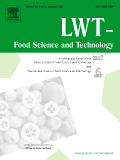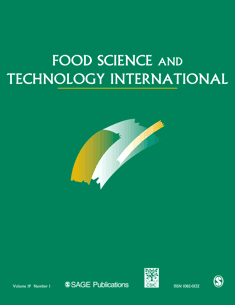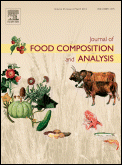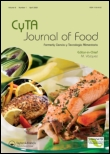
LWT-FOOD SCIENCE AND TECHNOLOGY
Scope & Guideline
Innovating solutions for contemporary food challenges.
Introduction
Aims and Scopes
- Food Preservation Techniques:
Research on novel preservation methods including the use of natural antimicrobials, high-pressure processing, and advanced packaging technologies to extend the shelf-life and quality of food products. - Microbial and Fermentation Studies:
Exploration of the roles of various microorganisms in food fermentation processes, including the characterization of probiotics and their effects on food quality and safety. - Functional Food Development:
Focus on the formulation and evaluation of functional foods that promote health benefits, including the incorporation of bioactive compounds, fibers, and probiotics. - Food Quality and Safety Assessment:
Studies addressing the physicochemical properties, sensory characteristics, and microbiological safety of food products throughout their processing and storage. - Analytical Techniques in Food Science:
Application of advanced analytical methods, such as metabolomics, proteomics, and chemometric approaches, for the characterization of food components and quality assessment. - Innovative Food Processing Technologies:
Research on modern food processing technologies, including ultrasound, microwave, and novel extraction methods aimed at enhancing food quality and nutritional value.
Trending and Emerging
- Sustainable Food Practices:
Research focusing on sustainability, including waste valorization and the use of by-products from food processing, is gaining traction as the industry moves towards more eco-friendly practices. - Plant-Based and Alternative Proteins:
There is an increasing emphasis on the development and characterization of plant-based proteins and meat analogues, driven by consumer demand for healthier and more sustainable food options. - Natural Antimicrobials and Preservatives:
A growing interest in natural preservatives and their mechanisms of action is evident as researchers explore alternatives to synthetic additives. - Advanced Food Packaging Solutions:
Innovations in smart and active packaging technologies that enhance food safety and quality are becoming a significant area of research. - Microbiome and Fermented Foods:
The exploration of the relationship between gut microbiota and fermented foods is trending, highlighting the health benefits associated with probiotics and fermentation. - Functional Ingredients and Health Benefits:
Research is increasingly focusing on the health-promoting properties of functional ingredients, including their bioactive compounds and their effects on human health.
Declining or Waning
- Traditional Food Processing Methods:
There is a noticeable decrease in research focused on conventional food processing techniques, as modern techniques and technologies gain prominence. - Basic Nutritional Studies:
Research that solely emphasizes basic nutritional content without exploring functional or health-promoting aspects appears to be less frequent. - Chemical Additives in Food Technology:
The use of chemical food additives has seen a reduction in research focus as there is a growing consumer preference for natural and clean-label products. - Single Ingredient Studies:
Investigations that solely focus on the properties of single ingredients without considering their interactions in complex food systems are becoming less prevalent.
Similar Journals

Food Quality and Safety
Championing research that protects consumers.Food Quality and Safety is a leading academic journal published by Oxford University Press, dedicated to advancing research in the critical field of food science. With an ISSN of 2399-1399 and an E-ISSN of 2399-1402, the journal has gained prestigious recognition, securing a Q1 ranking in the Food Science category as per Scopus rankings, and being positioned at #69 out of 389 in its field, reflecting its influence and reputation within the discipline. Since its transition to Open Access in 2017, the journal has broadened its reach, ensuring that cutting-edge research related to food quality, safety measures, and consumer protection is accessible to researchers, professionals, and students alike. With a commitment to publishing high-quality articles and reviews, the journal addresses contemporary challenges in the food industry and promotes a better understanding of food safety protocols. Based in Oxford, United Kingdom, Food Quality and Safety plays a pivotal role in shaping future research and practices in food science, making it an essential platform for scholars who aim to impact the industry through innovative findings and applied research.

FOOD SCIENCE AND TECHNOLOGY INTERNATIONAL
Transforming food technology through cutting-edge research.FOOD SCIENCE AND TECHNOLOGY INTERNATIONAL, published by SAGE Publications Ltd, is a premier journal in the fields of food science and technology, serving as a crucial platform for the dissemination of innovative research and practical applications from 1995 through to 2024. With an impact factor reflecting its significant standing—ranking in the Q2 quartile for Chemical Engineering, Food Science, and Industrial and Manufacturing Engineering—this journal plays an instrumental role in advancing the interdisciplinary study of food systems. Researchers, professionals, and students can access high-quality contributions that address the latest developments and trends in food technology, safety, and processing. Located in the United States, FOOD SCIENCE AND TECHNOLOGY INTERNATIONAL also boasts commendable Scopus rankings, ensuring its articles are both relevant and widely cited within the academic community. As a vital resource for anyone engaged in food science research, этот журнал fosters knowledge sharing and innovation in the ever-evolving landscape of food technology.

FOOD SCIENCE AND BIOTECHNOLOGY
Shaping Tomorrow's Food Landscape with ScienceFOOD SCIENCE AND BIOTECHNOLOGY, published by the Korean Society of Food Science & Technology (KOSFOST), stands as a prominent peer-reviewed journal dedicated to advancing knowledge in the fields of food science, biotechnology, and applied microbiology. With ISSN 1226-7708 and E-ISSN 2092-6456, this journal serves as a pivotal platform for disseminating high-impact research from South Korea and beyond, reflecting a robust Q2 ranking in multiple categories including Applied Microbiology and Biotechnology, Biotechnology, and Food Science as of 2023. The journal's influence is further emphasized by its positions in various Scopus ranks, where it showcases a commendable percentile ranking in Agricultural and Biological Sciences and Biochemistry. Although access options remain limited, the journal’s objectives revolve around the publication of innovative research, fostering interdisciplinary collaboration, and facilitating the exchange of ideas among a diverse community of researchers, professionals, and students. Whether you are involved in food technology, microbial biotechnology, or nutritional sciences, FOOD SCIENCE AND BIOTECHNOLOGY are instrumental in shaping the future of these critical fields, propelling advancements that enrich our understanding of food systems and health.

ACS Food Science & Technology
Bridging Academia and Industry for Food SolutionsACS Food Science & Technology is a premier peer-reviewed journal published by the American Chemical Society (ACS) that addresses the dynamic intersections of food science, chemistry, and technology. With its E-ISSN: 2692-1944, this journal aims to disseminate innovative research and comprehensive reviews that enhance understanding in fields such as analytical chemistry, organic chemistry, and general food science. Despite the absence of an Open Access model, its position in the Q2 quartile for multiple categories in 2023 underscores its significant impact on the scholarly landscape, ensuring researchers can access high-quality research pertinent to today's food challenges. With an expanding timeline of 2021 to 2024, ACS Food Science & Technology is poised to be an essential resource for advancing the scientific community's knowledge, fostering collaboration, and bridging gaps between academia and industry.

JOURNAL OF THE JAPANESE SOCIETY FOR FOOD SCIENCE AND TECHNOLOGY-NIPPON SHOKUHIN KAGAKU KOGAKU KAISHI
Empowering Researchers in the World of Food ScienceWelcome to the JOURNAL OF THE JAPANESE SOCIETY FOR FOOD SCIENCE AND TECHNOLOGY-NIPPON SHOKUHIN KAGAKU KOGAKU KAISHI, a pivotal platform for the advancement of food science and technology. Published by the Japan Society for Food Science and Technology, this esteemed journal has been contributing to the field since 1995 and continues to publish innovative research and reviews that foster knowledge and collaboration among researchers, professionals, and students interested in food science. Although it currently holds a Q4 ranking within the Food Science category, the journal's commitment to disseminating valuable insights showcases its potential as a resource for emerging trends and applications in food technology. While it does not offer open access options, it maintains a rigorous peer-review process to ensure the quality of its content. As this journal progresses into its convergence years through 2024, it remains an essential resource for those passionate about exploring the intersections of food science and technology in Japan and beyond.

JOURNAL OF FOOD SCIENCE AND TECHNOLOGY-MYSORE
Elevating Knowledge in Food Innovation and PreservationJOURNAL OF FOOD SCIENCE AND TECHNOLOGY-MYSORE, published by SPRINGER INDIA, is a distinguished peer-reviewed journal that has been contributing to the ever-evolving field of food science since its inception in 1974. With an ISSN of 0022-1155 and E-ISSN 0975-8402, this journal holds a commendable position in the Q2 category for Food Science, as per the 2023 metrics, and ranks #58 out of 389 in Scopus's Agricultural and Biological Sciences sector, achieving an impressive 85th percentile. The journal publishes high-quality research articles, reviews, and case studies that cover a wide array of topics, from food preservation to innovative technologies in food processing. Although it is not an open-access journal, it endeavors to disseminate essential knowledge and research strategies that advance food science and benefit both industry professionals and academia. The geographical reach of the journal, alongside its rigorous editorial standards, solidifies its stature as a pivotal resource for researchers, professionals, and students dedicated to the enhancement of food science practices and technologies.

JOURNAL OF FOOD COMPOSITION AND ANALYSIS
Fostering Breakthroughs in Food Composition ScienceJOURNAL OF FOOD COMPOSITION AND ANALYSIS, published by Academic Press Inc. Elsevier Science, is a leading peer-reviewed journal in the field of Food Science, recognized for its substantial impact on advancing research and knowledge within the discipline. With a commendable Q1 quartile ranking in the 2023 category of Food Science and a Scopus rank of 86/389, this journal holds a prestigious position, emphasizing its significance in crop and food quality research. The journal's scope encompasses a wide range of studies related to food composition, nutrition, and analytical methodologies, aiming to foster innovation and knowledge dissemination in food science. Although it operates under a subscription model, it remains an essential resource for researchers, professionals, and students seeking credible and cutting-edge findings. Established in 1987, the JOURNAL OF FOOD COMPOSITION AND ANALYSIS continues to be at the forefront of food science, contributing to the understanding of food quality and nutrition standards globally.

CyTA-Journal of Food
Connecting researchers to enhance global food systems.CyTA-Journal of Food is a prestigious academic journal published by TAYLOR & FRANCIS LTD, dedicated to advancing the field of food science and technology through the dissemination of innovative research and practical knowledge. With an ISSN of 1947-6337 and an E-ISSN of 1947-6345, this journal stands out with its strong impact factor and is currently placed in the Q2 quartile across multiple categories, including Chemical Engineering, Chemistry, and Food Science, making it a vital resource for researchers and professionals alike. The journal has been an integral part of the academic community since its inception in 2009, and continues to publish cutting-edge articles through to 2024. Its alignment with Scopus ranks further signifies its influence, notably achieving 67th percentile in Industrial and Manufacturing Engineering. As an Open Access journal, it ensures widespread accessibility to its valuable content, promoting collaboration and knowledge sharing among scientists, engineers, and students dedicated to enhancing food safety, quality, and sustainability.

Acta Scientiarum Polonorum-Technologia Alimentaria
Pioneering Insights in Food Safety and QualityActa Scientiarum Polonorum-Technologia Alimentaria, published by Poznan University of Life Sciences, is a revered journal in the field of food science, showcasing cutting-edge research and innovations in food technology. Established as a leading platform within its domain, this journal is indexed under Scopus and ranks in the 2023 Q3 quartile for Food Science, demonstrating its commitment to high-quality scholarship. With an ISSN of 1644-0730 and E-ISSN 1898-9594, it serves as a critical resource for researchers, professionals, and students seeking to stay at the forefront of advancements in food safety, quality control, and sustainable practices. The journal has also been recognized for its contributions to the agricultural and biological sciences, positioning itself at rank #205 out of 389 in this competitive field. While currently not offering open access, the journal's valuable insights and findings, especially as it publishes through 2024, play a crucial role in advancing knowledge and fostering collaboration among experts in the food science sector.

Food Chemistry: Molecular Sciences
Exploring Innovations at the Intersection of Food and ScienceFood Chemistry: Molecular Sciences is a leading academic journal published by ELSEVIER, dedicated to advancing knowledge in the fields of food science and molecular biology. With an ISSN of 2666-5662, this journal is a key platform for researchers and professionals aiming to disseminate innovative research findings from 2020 through 2024. Recognized for its quality, it stands in the Q1 category for Food Science and Q2 for Molecular Biology as of 2023, showcasing its commitment to high-impact publications. The journal is indexed in Scopus, earning ranks of #98/389 (74th percentile) in Agricultural and Biological Sciences - Food Science and #214/410 (47th percentile) in Biochemistry, Genetics and Molecular Biology - Molecular Biology. Each article represents cutting-edge research that drives the understanding and application of molecular principles in food chemistry, making it an essential resource for anyone involved in the field. Although this journal does not offer open access, its rigorous peer-review process ensures that the content is reliable and of significant academic value, contributing profoundly to the body of knowledge in the respective disciplines. Located in Amsterdam, Netherlands, Food Chemistry: Molecular Sciences continues to inspire scholarly discussion and innovation within the scientific community.